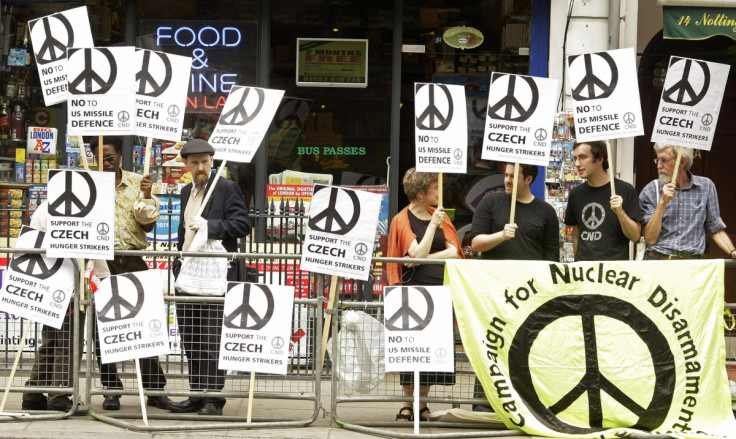Labour Trident row: 10,000 sign up for CND rally where Corbyn and Sturgeon will speak

Almost 10,000 activists are expected to march on London as part of an anti-nuclear weapons rally on 27 February. The demonstrators will be joined by Labour leader Jeremy Corbyn, the First Minister of Scotland Nicola Sturgeon, and the Green Party's only MP Caroline Lucas.
The event is organised by the Campaign for Nuclear Disarmament (CND), who claim the majority of the British electorate oppose nuclear weapons. More than 9,800 people have registered their attendance on the group's Facebook page.
"They are weapons of mass destruction that can kill millions. They don't keep us safe and they divert resources from essential spending," a statement from the CND said. "Join us to say No to government plans to buy a new system at a cost of over £100bn ($139bn)."
Corbyn's attendance at the rally has reignited Labour's internal row over the renewal of the Trident nuclear deterrent.
The GMB Union told IBTimes UK that scrapping the system could lead to "tens of thousands" of jobs being axed and the union's Scottish secretary blasted the Labour's leader's "wine bar politics".
"This is not a debate for the wine bars of Islington and Edinburgh – this is real life for the workers and their communities," Gary Smith declared.
"This is not a fight we picked. The people who started this argument clearly have no idea of the massive ramifications for not renewing Trident and they don't understand how the whole shipbuilding industry and defence sector is linked together."
What is Trident?
Trident is the name given to the UK's fleet of nuclear submarines that carry – and would launch – the nation's nuclear arsenal.
The fleet consists of four Vanguard-class submarines capable of carrying 16 Trident II D-5 ballistic missiles that give the programme its name.
Based in Clyde, Scotland, at least one submarine is always deployed while the others undergo maintenance and take part in training exercises.
If MPs vote to renew the fleet it would be ready for service in 2028. The government puts the cost of replacing Trident at £20bn but critics say it is much higher than that.
That is one of the reasons why Trident is a political hot potato, the other being jobs. About 6,700 military military staff and civilian workers are based at HM Naval Base Clyde.
The union boss was speaking after the GMB held a conference on Trident in Newcastle.
The event was attended by Labour MPs Kevan Jones and John Woodcock, local councillors and representatives for workers linked to the nuclear system from Barrow, Devonport, Faslane, Coulport, Rosyth, Clydeside, Derby and Merseyside.
Labour deputy leader Tom Watson intervened in the debate on 24 February, when it emerged that Corbyn would be speaking at the CND rally.
Watson urged David Cameron to hold a vote on the issue in the House of Commons and claimed a majority of Labour MPs would back the government.
"I'm in favour of a continuous at sea nuclear deterrent. My party's policy favours a continuous at sea nuclear deterrent," he told the EEF national manufacturing conference.
"Our trade unions, who represent thousands of workers in the 450 companies who form the supply chain that make it, are in favour of Trident. You may have read that this view is not shared by all our MPs. But I have made it clear to David Cameron that if he honours his promise of a vote on Trident I will support it.
"There are enough Labour MPs to guarantee that the vote is won. I know the prime minister is currently pre-occupied with the European Referendum, but I happen to believe that the sooner this vote is tabled, the greater certainty we can give to industry, our allies and our enemies, that British industry will deliver the Trident project in good time."
The row comes as Labour's shadow defence secretary and unilateralist Emily Thornberry is conducting a review into the party's defence policy, including Trident.
© Copyright IBTimes 2025. All rights reserved.






















